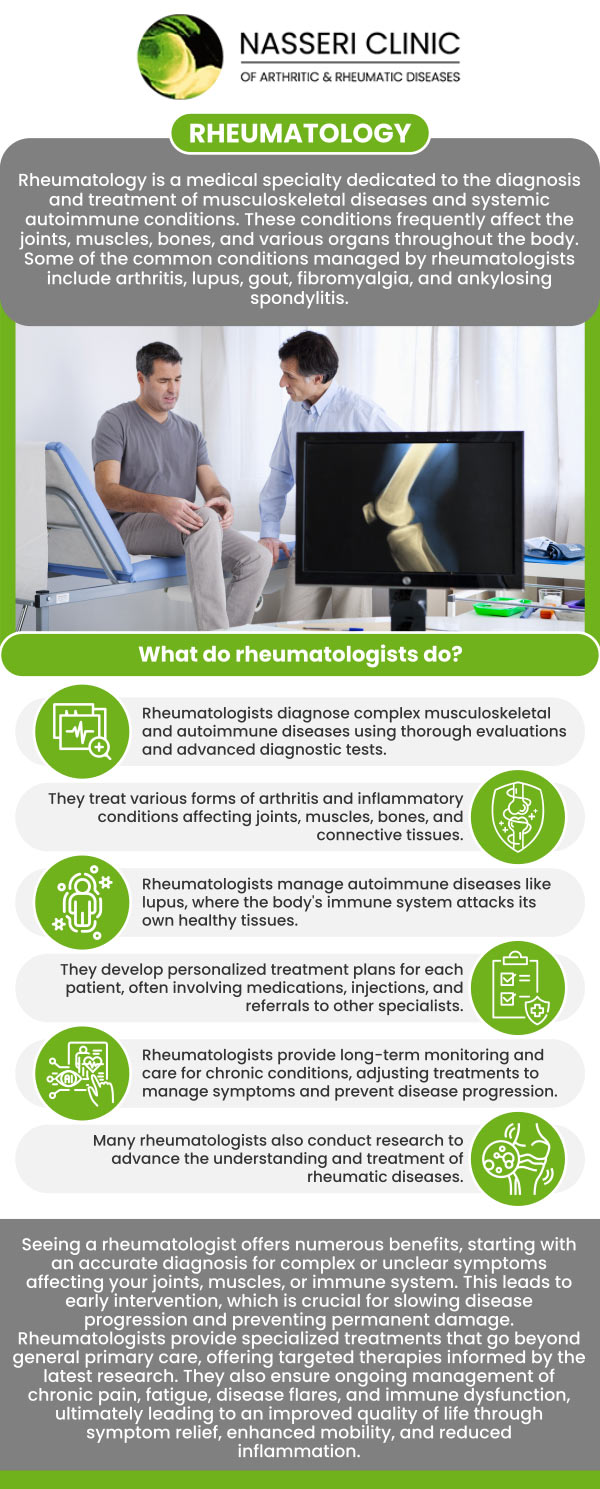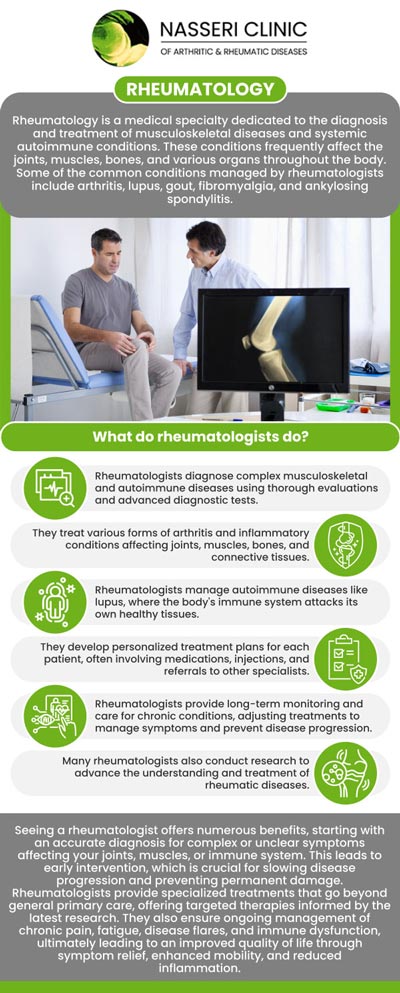What Is a Rheumatologist and When Should You See One?
A rheumatologist is a physician who focuses on the identification and management of musculoskeletal disorders and autoimmune illnesses. If you have chronic joint pain, swelling, stiffness, or other symptoms associated with autoimmune diseases or arthritis, you should consult with our board-certified rheumatologist, Dr. Nasser Nasseri, MD, and his team at Nasseri Clinic of Arthritic & Rheumatic Diseases. For more information, contact us or schedule an appointment online. We have convenient locations to serve you in Catonsville, Glen Burnie, Columbia, North Baltimore, Rosedale, and Edgewater, MD.




Table of Contents:
What symptoms require a rheumatologist?
How does a rheumatologist test for inflammation?
When would you be referred to a rheumatologist?
What tests does a rheumatologist do?
A rheumatologist is a specialized healthcare professional who diagnoses and treats autoimmune diseases, musculoskeletal disorders, and arthritis. These medical experts play a crucial role in managing chronic inflammatory conditions, offering both therapeutic and rehabilitative solutions tailored to individual needs. At Nasseri Clinic of Arthritic and Rheumatology, patients can expect comprehensive care that combines state-of-the-art diagnostic techniques with advanced treatment options. Whether you’re dealing with persistent joint pain, inflammation, or other symptoms suggestive of a rheumatic disease, seeking the expertise of a rheumatologist at Nasseri Clinic can be a pivotal step towards achieving better health and an improved quality of life.
Recognizing the symptoms that necessitate a consultation with a rheumatologist is crucial for the timely diagnosis and treatment of rheumatic diseases. These symptoms often revolve around persistent joint pain, stiffness, and swelling, which could indicate underlying conditions such as rheumatoid arthritis or lupus. Systemic signs, including fatigue, fever, or unexplained weight loss, accompanied by muscle pain and weakness, could also suggest systemic autoimmune disorders. Furthermore, the occurrence of dry eyes and mouth, skin rashes, or chronic sores alongside these symptoms may signal connective tissue diseases. In cases where these symptoms significantly impair daily activities or persist despite initial treatments, seeking the expertise of a rheumatologist becomes essential for a comprehensive evaluation and management plan.
A rheumatologist employs a variety of methods to test for inflammation, which is key to diagnosing and managing conditions affecting the joints, muscles, and bones. These tests include blood analyses that measure levels of inflammatory markers such as the C-reactive protein (CRP) and the erythrocyte sedimentation rate (ESR), which often rise in the presence of active inflammation. Imaging tests like MRI, ultrasound, and X-rays give detailed views of joints and tissues affected by inflammation or damage. Joint fluid analysis is another critical diagnostic tool, where fluid drawn from affected joints is examined for evidence of disease. Together, these methods provide a comprehensive overview of the inflammation’s extent and nature, guiding effective treatment strategies.
Being referred to a rheumatologist often occurs after an initial consultation with a primary care provider who suspects the presence of an autoimmune or rheumatic condition. If you experience persistent joint pain, inflammation, or other symptoms suggestive of autoimmune diseases, and these symptoms do not improve with standard treatment, a referral might be the next step. Additionally, if there’s a need for specialized diagnostic tests or a more comprehensive evaluation to understand complex symptoms, a rheumatologist’s expertise is crucial. Ultimately, a timely referral can lead to effective management of the condition, improving one’s quality of life by addressing both the symptoms and the underlying causes of rheumatic diseases.
A rheumatologist conducts a suite of specialized tests to diagnose and manage rheumatic diseases effectively. These include blood tests designed to identify specific autoimmune markers, antibodies, and other signs of inflammation, such as antinuclear antibodies (ANA), rheumatoid factor (RF), anti-cyclic citrullinated peptide (anti-CCP) antibodies, and a comprehensive metabolic panel (CMP). Imaging tests, such as X-rays, magnetic resonance imaging (MRI), and ultrasound, are critical for assessing the condition of joints and tissues, helping to identify areas affected by inflammation or damage. Additionally, a rheumatologist may perform a joint fluid analysis, extracting fluid from a swollen joint to look for inflammation, infection, or crystals that indicate conditions like gout. Through these diagnostic tools, a rheumatologist can pinpoint the nature of a rheumatic condition, and its severity, and monitor the effectiveness of treatment over time, ensuring a targeted and personalized approach to management and care.
Confronting the challenges of autoimmune and rheumatic conditions requires expert care and a comprehensive approach to treatment. At Nasseri Clinic of Arthritic and Rheumatology, our dedicated team of specialists is committed to providing personalized care that can lead to significant improvements in your health and daily life. If you’re experiencing the symptoms or conditions discussed, please do not hesitate to reach out. You can contact us to speak directly with our friendly staff or book an appointment online at your convenience. Together, we can work towards a healthier, more comfortable future for you. We serve patients from Catonsville MD, Glen Burnie MD, Columbia MD, Baltimore MD, North Baltimore MD, Rosedale MD, Edgewater MD, Hebbville MD, Woodlawn MD, Pasadena MD, Jacobsville MD, Ellicott City MD, Laurel MD, Dundalk MD, Halethorpe MD, Overlea MD, Parkville MD, Riva MD, Annapolis MD, Ferndale MD, and surrounding areas.
Check Out Our 5 Star Reviews


Additional Services You May Need

Additional Services You May Need
▸ Arthritis Care
▸ Infusion Therapy
▸ Lab Services
▸ Radiology
▸ NCARD NRACE
▸ BioFlex Laser Therapy
▸ Ultrasound Guided Injection
▸ NCARD PRP
▸ NCARD Myers
▸ Rheumatology
▸ Myositis
▸ Osteoporosis
▸ Ulcerative Colitis
▸ Multiple Sclerosis
▸ Saphnelo Infusion
▸ Injection Treatments
▸ Intravenous Immunoglobulin Therapy
▸ Asthma
▸ Crohn’s Disease
▸ Fibromyalgia
▸ Infusion Therapy for Gout
▸ Inflammatory Eye Disease
▸ Inflammatory Skin Disease
▸ Vasculitis
▸ Iron Deficiency
▸ Lupus


